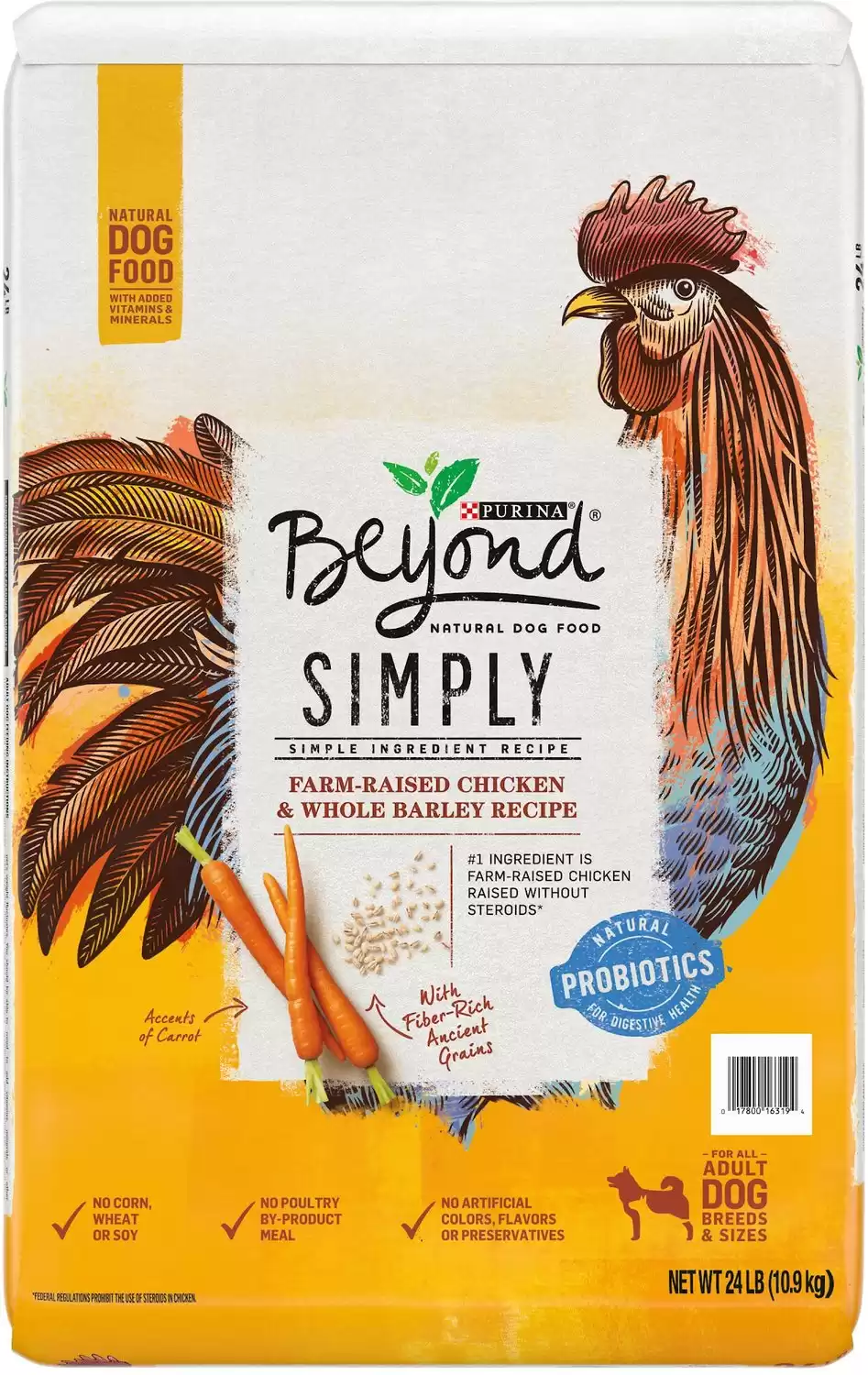Lhasa Apso
Canis lupus
The Lhasa Apso was often given as a gift in Tibetan culture
Advertisement
Lhasa Apso Scientific Classification
- Kingdom
- Animalia
- Phylum
- Chordata
- Class
- Mammalia
- Order
- Carnivora
- Family
- Canidae
- Genus
- Canis
- Scientific Name
- Canis lupus
Read our Complete Guide to Classification of Animals.
Lhasa Apso Conservation Status
Lhasa Apso Facts
- Fun Fact
- The Lhasa Apso was often given as a gift in Tibetan culture
- Temperament
- Confident, friendly, and comical
- Diet
- Omnivore
Lhasa Apso as a Pet:
- General Health
- Energy Level
- Shedability
- Trainability
- Intelligence
- Tendency to Chew
- Size
- Family and kid friendliness
- Yappiness / Barking
- Moderate
- Separation Anxiety
- Moderate
- Preferred Temperature
- Average climate
- Exercise Needs
- Moderate
- Friendly With Other Dogs
- Moderate
- Pure bred cost to own
- $500 to $1,500 on average
- Dog group
- Non-sporting
- Male weight
- 12-18 lbs
- Female weight
- 12-18 lbs
This post may contain affiliate links to our partners like Chewy, Amazon, and others. Purchasing through these helps us further the A-Z Animals mission to educate about the world's species.
View all of the Lhasa Apso images!
The Lhasa Apso’s original Tibetan name is Abso Seng Kye, which actually means (roughly) “bark lion sentinel dog.” It seems to have some association with the mythical snow lion in traditional Tibetan culture, which is said to protect the country. These dogs were often given as gifts as signs of friendship but never actually sold.
The Lhasa Apso is a small dog breed from Tibet, characterized by a curled feathery tail and long, flowing hair that obscures the eyes and touches the ground. There are many accepted color schemes, including black and tan, cream, golden, white, and red. The elegant fur belies its original purpose as a guard dog of palaces and monasteries high up in the Himalayas. The history dates back more than a thousand years ago near the capital city region of Lhasa. This breed first came to the United States as a gift from the Dalai Lama in the mid-20th century.
See all of our expert product reviews.
Lhasa Apso Vs. Shih Tzu
Both the Lhasa Apso and Shih Tzu are remarkably similar in their long, flowing coats, small stature, flat snout, and affectionate temperament. The main difference is that the Shih Tzu is more of a lap dog than a guard dog.
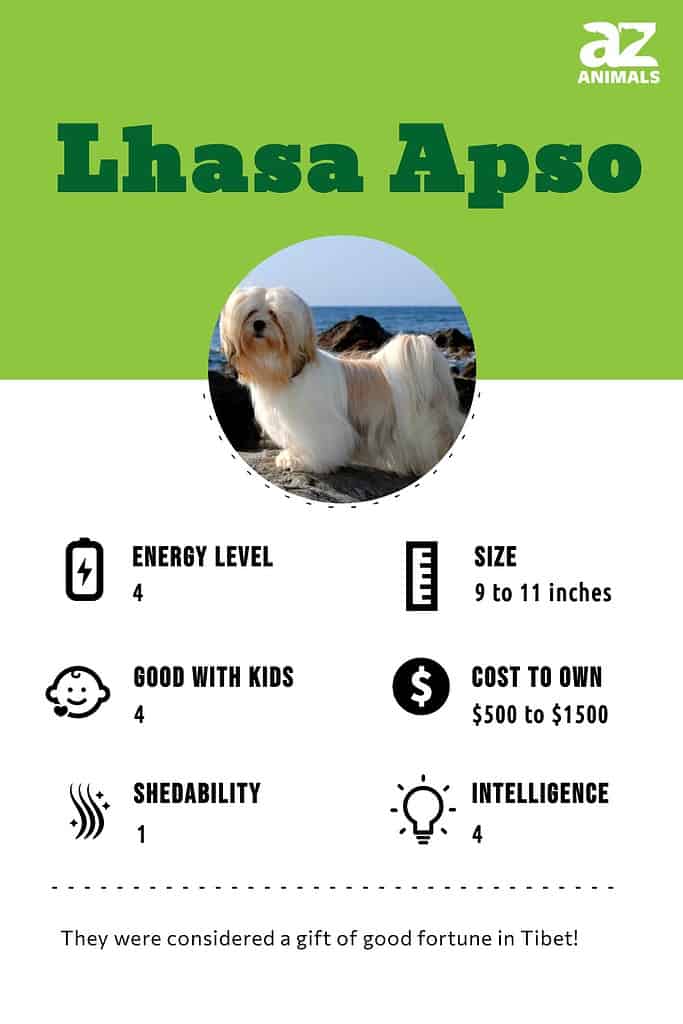
3 Pros And Cons Of Owning A Lhasa Apso
| Pros! | Cons! |
|---|---|
| Friendly and Affectionate The Lhasa Apso ranks very highly in its love of people. | Requires Frequent Grooming The long coat of fur takes a lot of time and effort to properly maintain. |
| Protective This breed makes for a great watchdog (though it might be too small to actually deter intruders). | Stubborn The Lhasa Apso has a slight stubborn streak that may make it difficult to train. |
| Excellent Lifespan The Lhasa Apso can live for a long time. | Fragile This dog must be handled with care. |
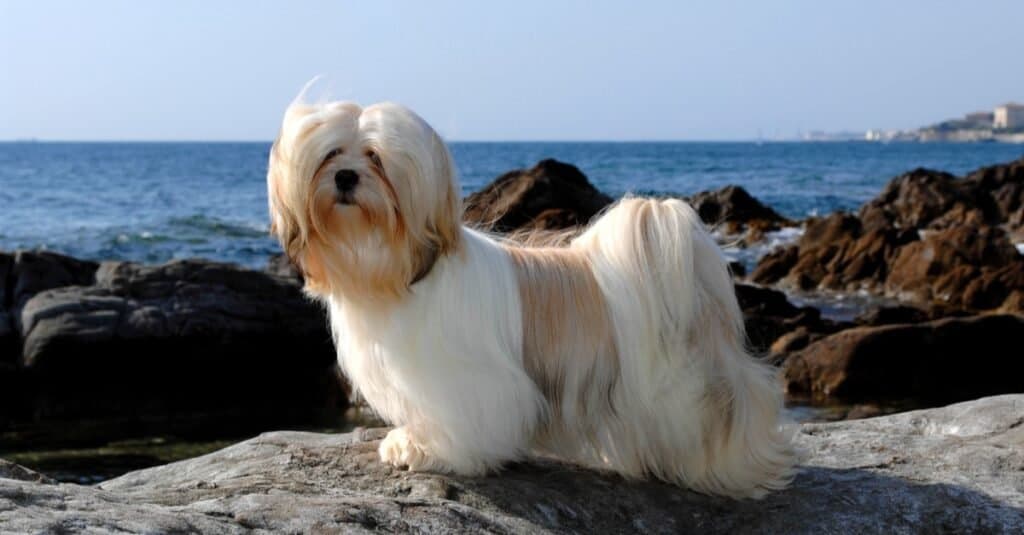
©Ricantimages/Shutterstock.com
History Of The Breed
The Lhasa Apso is an ancient breed, with a long history in their country of origin, Tibet, dating back to at least 800 CE. For centuries, they used to live in the Himalayan Mountains in isolation with Tibetan Monks. Considered a sacred breed, they were highly regarded and to receive this breed as a gift was considered good fortune. The Lhasa Apso came to the United States in the 1930s when the 13th Dalai Lama gifted a pair to the American explorer and philanthropist Charles Suydam Cutter and his wife.
Size And Weight
The Lhasa Apso is a very small dog with a thin frame. Males are ever so slightly larger than females, but the difference is fairly minimal.
| Height (Male) | 10 to 11 inches |
| Height (Female) | 9 to 11 inches |
| Weight (Male) | 12 to 18 pounds |
| Weight (Female) | 12 to 18 pounds |
Common Health Issues
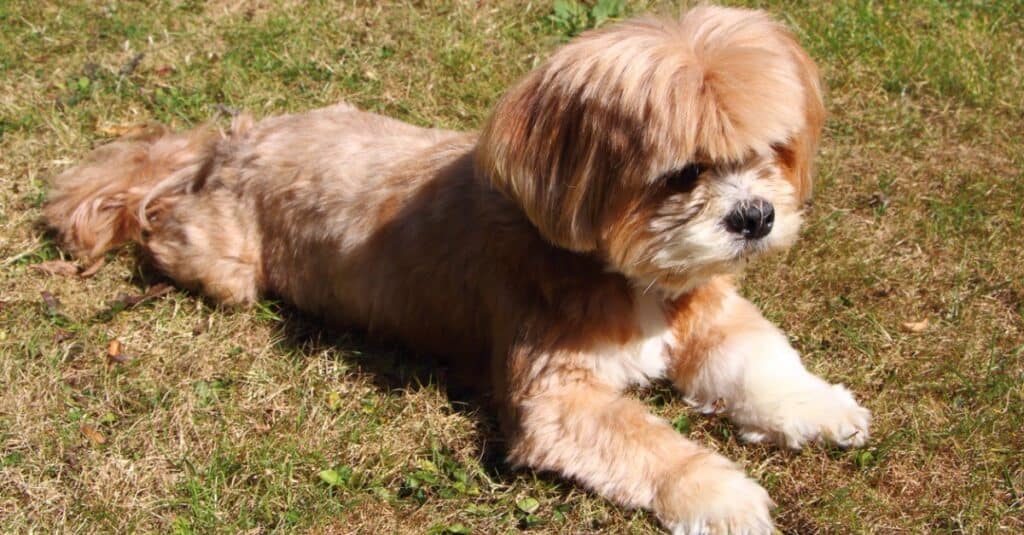
Lhasa Apsos are prone to several health conditions are should be taken to the vet for regular checkups.
Health and Entertainment for your Lhasa Apso
See all of our expert product reviews.
©iStock.com/oceane2508
The Lhasa Apso has an excellent lifespan of 12 to 15 years, but it may be prone to several health conditions, including progressive retinal atrophy, cancer, allergies, renal disorders, cherry eye (in which an eye gland swells up), and a dry inflammatory skin condition called sebaceous adenitis. Another common problem is patellar luxation in which the kneecap slides in and out of place. This can result in lameness and pain over the dog’s lifetime.
There are a few things you can do to maximize the dog’s long-term quality of life. First, you should find a good breeder who will always give their puppies a thorough medical evaluation; you should also follow up with your vet on a regular basis to check for common health issues. In summation, these are the most common health problems with the Lhasa Apso:
- Allergies
- Cancer
- Progressive Retinal Atrophy
- Sebaceous Adenitis
Temperament

Lhasa Apso has a history of being a guard dog due to its strong instinct to protect.
©iStock.com/xyom
The Lhasa Apso is an affectionate, friendly, and confident pet in the non-sporting group. It has a long history as a guard dog, dating back more than a thousand years. With a strong instinct to protect and watch over the home, it will alert the owner to any possible danger or unfamiliar people. Behavior problems are relatively minimal, but they might exhibit some stubbornness and impatience from time to time.
Fortunately, this breed can adapt very well to a wide variety of different living conditions and daily schedules, and its physical and mental needs are both fairly moderate. It is also buoyed by a playful and comic personality.
How To Take Care Of The Lhasa Apso
The Lhasa Apso is a good choice for owners across the entire experience spectrum. The most difficult part of the entire ownership process is probably grooming. Expect to spend a lot of time and effort keeping the coat in good shape. Training can also present a few difficulties.
The Best Dog Foods For Lhasa Apsos
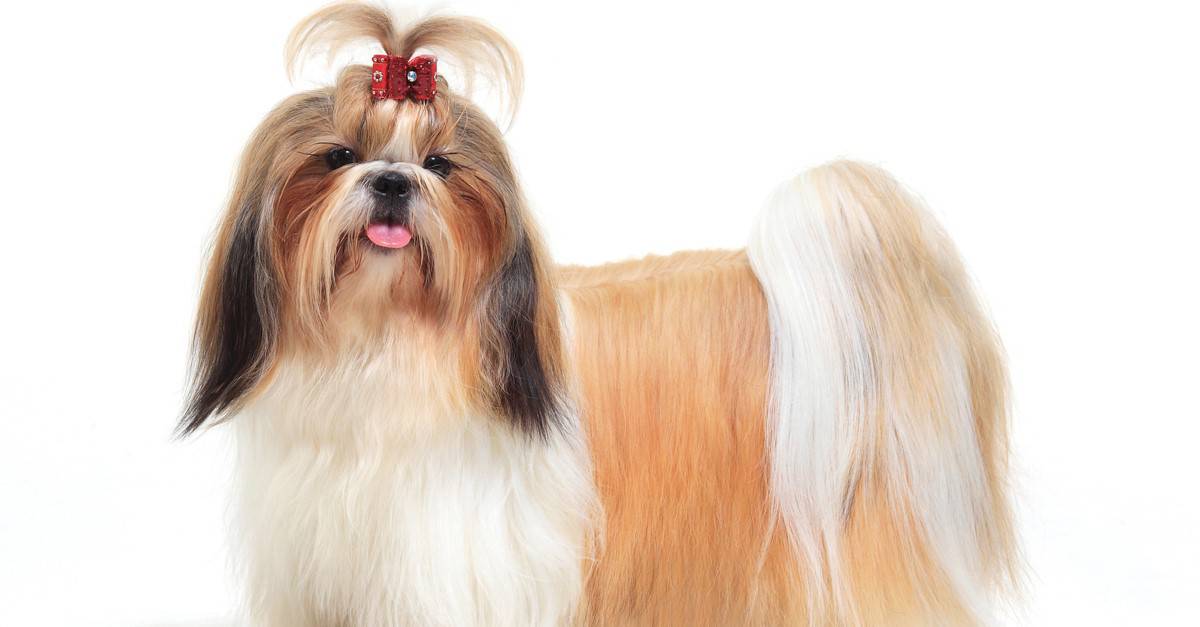
Lhasa Apso may have allergies so a specific food developed for this issue may be best.
©Rombrant77/Shutterstock.com
The Lhasa Apso probably needs no more than a cup of high-quality dry food per day. You may need to adjust the precise amount based on the dog’s age, size, and activity level.
If you notice your Lhasa Apso struggling with allergies, try out anti-allergy dog food. At A-Z Animals, we think Purina Beyond Simply, Natural Adult Dry Dog Food can go a long way for your Lhasa Apso.
This limited-ingredient recipe nourishes your Lhasa Apso with beef, without many of the grains and artificial additives that can cause allergies and exacerbate inflammation related to sebaceous adenitis.
Get Purina Beyond Simply Natural Dog Food here on Chewy and Amazon.
Maintenance And Grooming
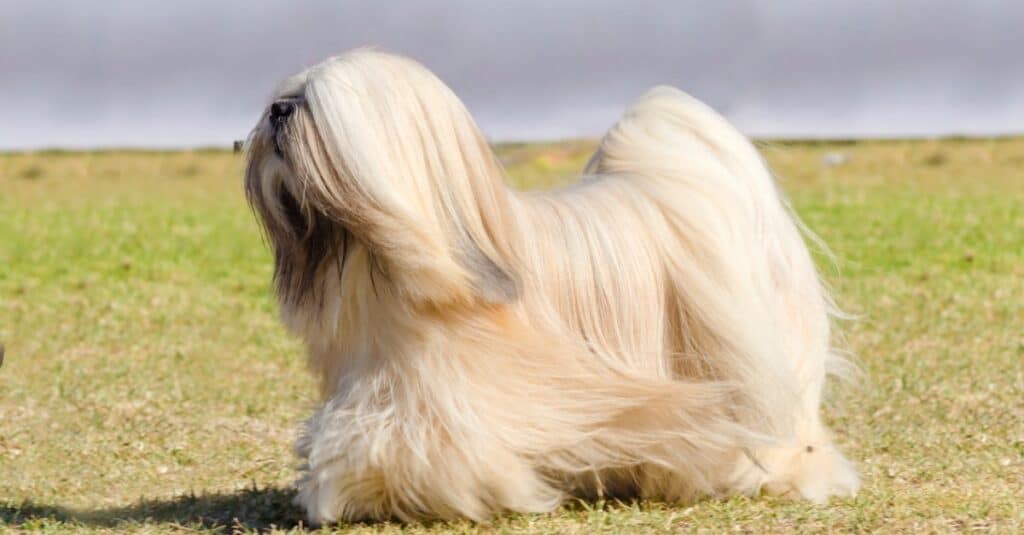
Lhasa Apsos will need a lot of grooming due to their long, flowing coat.
©iStock.com/f8grapher
It’s immediately evident from the long, flowing coat that you will need to spend a lot of time grooming this breed. The Lhasa Apso will require almost daily brushing and combing, as well as regular baths every two to four weeks, preferably with conditioners and finishing sprays; rinse the fur thoroughly to prevent skin irritation from the shampoo. Clipping can be a very difficult and time-consuming process. If you don’t want to do it yourself, then you can elect to hire the services of a professional groomer. It might be a good idea to keep the coat short so it’s easier to brush every day.
In addition to grooming, you should also brush their teeth at least two or three times a week with a toothpaste recommended by the vet; this should prevent disease and bad breath. Trim the nails about once or twice a month before they start clicking on the floor. Finally, check the ears for infection regularly and clean them out with a cotton ball and cleanser.
Training
The Lhasa Apso is equal parts intelligent and willful. They grow bored easily from repetition and may ignore you if they feel bullied in some manner. The key is to keep the training process interesting but consistent. Do not deviate or change your commands arbitrarily, but do change the structure and tempo of the training process to keep your dog motivated.
Exercise
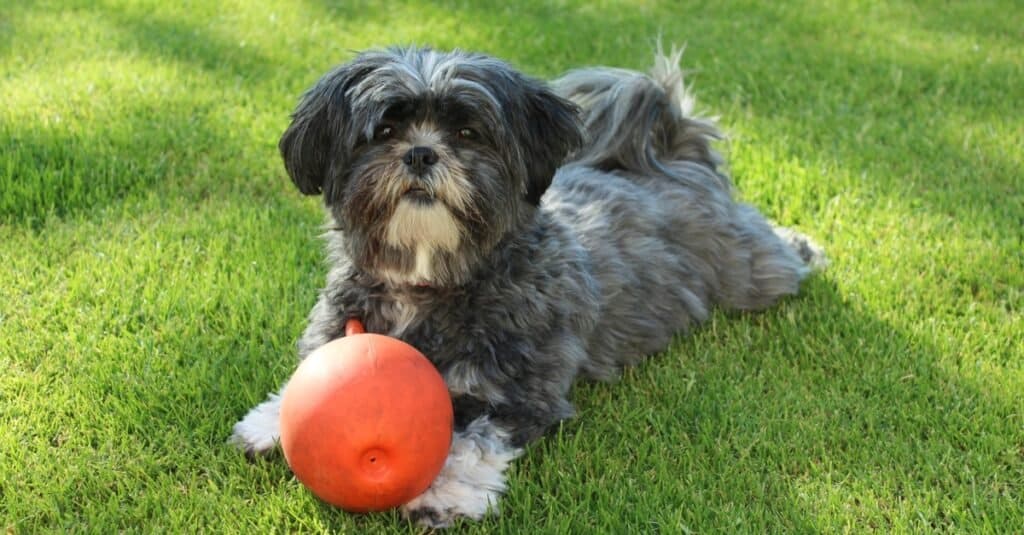
The Lhasa Apso will need at least 30 minutes of daily exercise.
©Lianne McKnight/Shutterstock.com
The Lhasa Apso needs a moderate amount of exercise every day, probably around 30 minutes. Since this breed isn’t too active, a brisk walk and some indoor playtime should suffice. It also likes to run around and entertain itself in a fenced yard.
Puppies
The puppies mature slowly and take nearly three years to reach adulthood; expect some puppyish behavior until it fully matures. In the meantime, they need to be socialized and housetrained as early as possible; get them used to being handled and introduce them to as many unique situations as possible.
Crate training can help make the housetraining process easier and also ease some of the dog’s anxiety. After several months, this breed should begin learning more advanced commands. Proper training will help reduce behavior problems later in life.

©Ruth Black/Shutterstock.com
The Lhasa Apso And Children
These dogs may get along well with children, but probably not as well as with adults. It does have a tendency to nip and may become impatient with children’s antics. If you choose to bring this breed into your home, you should supervise all interactions between the dog and the youngest kids.
Dogs Similar To The Lhasa Apso
These closely related Tibetan/Chinese breeds share a similar temperament and appearance to the Lhasa Apso.
- Shih Tzu: While not quite as protective and watchful as the Lhasa Apso, this breed has a short snout and a very similar coat of long, flowing hair. Some people even believe that the Shih Tzu was produced from a cross between a Lhasa Apso and another breed, possibly the Pekingese. It later become prized among Chinese nobility.
- Tibetan Spaniel: This breed also originated as a watchdog in Tibetan monasteries. It has a flat muzzle, expressive eyes, drooping ears, a plumed tail, and a mane of fur around the neck. Cream, black, fawn, gold, white, and tan are all accepted colors.
- Tibetan Terrier: This is yet another Tibetan watch or guard dog. Also known as the Holy Dog of Tibet, it bears a strong resemblance to the Lhasa Apso, thanks in part to the long, flowing fur. The main difference is that the Tibetan Terrier is slightly larger. It also has large snowshoe-like feet, which help it navigate the snowy mountain terrain.
Famous Lhasa Apso Dogs
Since it was first introduced, these dogs have made a significant impression on American culture. Some of the most famous owners include the singer and actor Liberace, the novelist Kurt Vonnegut, the actress Elizabeth Taylor, singer Gwen Stefani, and actress and TV host, Ellen DeGeneres.
Popular Names For The Lhasa Apso
If you’re still struggling to come up with a good name for your dog, then you might want to consider the following options:
- Bella
- Lola
- Buddy
- Leo
- Fifi
- Toby
- Penny
- Teddy
- Mia
- Rocky
Lhasa Apso FAQs (Frequently Asked Questions)
What is a Lhasa Apso?
The Lhasa Apso is a small non-sporting dog with a long history dating back in Tibet. It served the purpose of both a guardian and a companion.
Are Lhasa Apso good pets?
That depends on what characteristics are important to you. While the Lhasa Apso isn’t very athletic, it is a very good all-around companion: smart, affectionate, charming, and capable of forming a strong bond with its owner.
Do Lhasa Apso like to cuddle?
Yes, the Lhasa Apso is a good cuddling pet, but keep in mind it is also independent and may not be attached to its owner at all times.
Do Lhasa Apso dogs shed?
The Lhasa Apso sheds surprisingly little given the length of its coat. While not considered to be hypoallergenic, at least it will keep a lot of fur off your furniture and clothing. Keep in mind that no dog is truly hypoallergenic for everyone, and individual reactions will always vary.
What is bad about Lhasa Apso?
Behavior problems are minimal, but the Lhasa Apso can be a little headstrong and stubborn, which may make it slightly difficult to train. The coat can also require a lot of effort to maintain.
How do you groom a Lhasa Apso?
The Lhasa Apso needs to be brushed almost daily with a brush and comb. It also needs regular baths every two to four weeks with conditioners and finishing sprays. Clipping requires delicate work, so unless you’ve mastered the technique, it’s a good idea to let a professional groomer handle this aspect of its care.
How long do Lhasa Apso live?
The typical lifespan of the Lhasa Apso is 12 to 15 years, but it has been known to live into its twenties. The oldest member of this breed lived around 29 years old.
How big do Lhasa Apso get?
The Lhasa Apso normally grows no larger than 18 pounds, though there might be exceptions.
What does a Lhasa Apso look like?
The Lhasa Apso is characterized by a short snout, a curly tail, and long, flowing hair in various possible color combinations, including white, black, gold, and red. It is among the smaller breeds in the world.
What is the price of a Lhasa Apso?
The price of a new puppy can be anywhere between $500 and $1,500, perhaps more for a dog with a great pedigree. If price is a concern, then you might want to consider adoption from a rescue shelter. Rescue dogs are generally well cared for and need a loving home. There might even be a rescue dedicated specifically to this breed in your area.
What are some different types of mixed breeds?
By interbreeding with different dogs, the Lhasa Apso can produce a Shih Apso (a Shih Tzu mix), a Lhasa Poo (a Poodle mix), a Yorkie Apso (a Yorkshire Terrier mix), and many others.
What are the differences between Tibetan Terriers and Lhasa Apsos?
The most obvious difference between Tibetan Terriers and Lhasa Apsos is their size. Other differences include appearance, temperament, exercise, and age of maturity.
Thank you for reading! Have some feedback for us? Contact the AZ Animals editorial team.
Sources
- American Kennel Club, Available here: https://www.akc.org/dog-breeds/lhasa-apso/
- American Kennel Club, Available here: https://www.akc.org/expert-advice/lifestyle/8-facts-about-the-lhasa-apso/
- Dogtime, Available here: https://dogtime.com/dog-breeds/lhasa-apso#/slide/1
- 101 Dog Breeds, Available here: https://www.101dogbreeds.com/lhasa-apso-mixes
- American Kennel Club, Available here: https://www.akc.org/expert-advice/lifestyle/8-facts-about-the-lhasa-apso/





